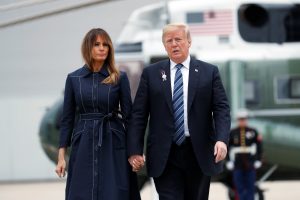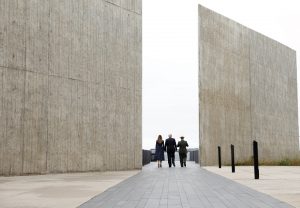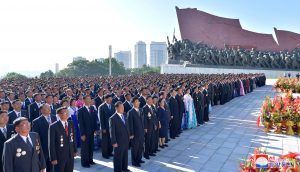
By Hyonhee Shin and Susan Heavey
SEOUL/WASHINGTON (Reuters) – North Korea’s Kim Jong Un has given his first timeline for denuclearization, aiming for the end of U.S. President Donald Trump’s first term, Seoul officials said on Thursday, prompting thanks from Trump who said they would “get it done together”.
Kim and South Korean President Moon Jae-in will also meet in Pyongyang on Sept. 18-20 for a third summit and discuss “practical measures” toward denuclearization, Moon’s national security adviser, Chung Eui-yong, said a day after meeting Kim.
The summit could provide renewed momentum to talks over denuclearization between North Korea and the United States, after Trump canceled a visit to Pyongyang by Secretary of State Mike Pompeo last month citing lack of progress.
Kim told South Korean officials his faith in Trump was “unchanged” and that he wanted denuclearization and an end to hostile relations with the United States before Trump’s first term in office ends in early 2021, Chung said.
“He particularly emphasized that he has never said anything negative about President Trump,” Chung said.
Trump welcomed Kim’s remarks in a trademark Tweet.
“Kim Jong Un of North Korea proclaims ‘unwavering faith in President Trump.’ Thank you to Chairman Kim. We will get it done together!” Trump wrote.
In previous, failed talks, North Korea has said it could consider giving up its nuclear program if the United States provided security guarantees by removing troops from South Korea and withdrawing its so-called nuclear umbrella of deterrence from the South and Japan.
U.S. officials involved in the latest negotiations have said North Korea has refused to even start discussions about defining denuclearization or other key terms such as “verifiable” and “irreversible”, and has insisted the United States must first agree to simultaneous steps to reduce economic pressure.
Pompeo, visiting New Delhi, declined to discuss the next steps but said there was a long road ahead in the denuclearization process.
Pompeo visited Pyongyang in July, after which North Korea accused him of making “unilateral and gangster-like demands for denuclearization” while showing little interest in ending the war.
“It is the case that there is still an enormous amount of work to do,” Pompeo told a news conference on Thursday.
Asked about U.S. intelligence that North Korea was still advancing its weapons programs, Pompeo noted that Pyongyang had ceased its nuclear tests and test-firing missiles, “which we consider a good thing.
“But the work of convincing Chairman Kim to make this strategic shift that we’ve talked about for a brighter future for the people of North Korea continues,” Pompeo said.
Moon’s national security adviser Chung said Kim had stressed the need for the United States to reciprocate North Korea’s initial moves, which have included dismantling a nuclear test site and a missile engine facility.
The U.S. embassy in Seoul said it had no information to share on the matter.
FRUSTRATION
North Korea’s official KCNA news agency said Kim told the South’s envoys that his “fixed stand” was to turn the Korean peninsula into “a cradle of peace without nuclear weapons, free from nuclear threat”.
Chung said Kim showed “frustration over the doubt raised by some parts of the international community about his willingness to denuclearize, and asked us to convey his message to the United States”.
“He said he would appreciate that such good faith is accepted with good faith,” Chung said. “He expressed his strong will to carry out more proactive measures toward denuclearization if action is taken in response to the North’s preemptive steps.”
U.S. officials have previously said they have already made concessions, such as halting joint military exercises with South Korea.
During his meeting with Kim, Chung delivered a message from Trump and will relay comments from Kim to U.S. National Security Advisor John Bolton, Moon’s spokesman, Kim Eui-kyeom, told reporters.
Trump spoke to Moon on the evening before Chung’s trip and asked Moon to act as “chief negotiator” between Washington and Pyongyang, the spokesman said.
WHAT HAPPENS FIRST?
Kim and Trump held a landmark summit in Singapore in June, in which they agreed to work toward complete denuclearization. But negotiations have made little progress, while signs North Korea has maintained work on its weapons have emerged.
Under discussion is whether denuclearization or declaring an end to the 1950-53 Korean War should come first.
The war ended with an armistice, not a peace treaty, meaning U.S.-led U.N. forces, including South Korea, are technically still at war with the North.
“The United States shouldn’t delay any further an end-of-war declaration, which the U.S. president promised at the Singapore summit,” the North’s official Rodong Sinmun newspaper said in an editorial.
U.S. officials have said such a declaration could weaken North Korea’s incentive for denuclearization, and create uncertainty about the purpose of 28,500 U.S. troops stationed in South Korea, a legacy of the three-year war.
“Looks like Kim is trying to wash away worries that talks could stall or fail, knowing well that Washington is losing patience,” said Koh Yu-hwan, a professor of North Korean Studies at Dongguk University in Seoul.
“Kim also made it clear that he needs some kind of proof Trump has abandoned the U.S.’s hostile policy before moving toward denuclearization. Kim is trying to prove his sincerity.”
(Additional reporting by Cynthia Kim Joyce Lee in SEOUL John Walcott and Susan Heavey in WASHINGTON and Phil Stewart in NEW DELHI; Writing by Soyoung Kim; Editing by Chris Cushing and Nick Macfie)












